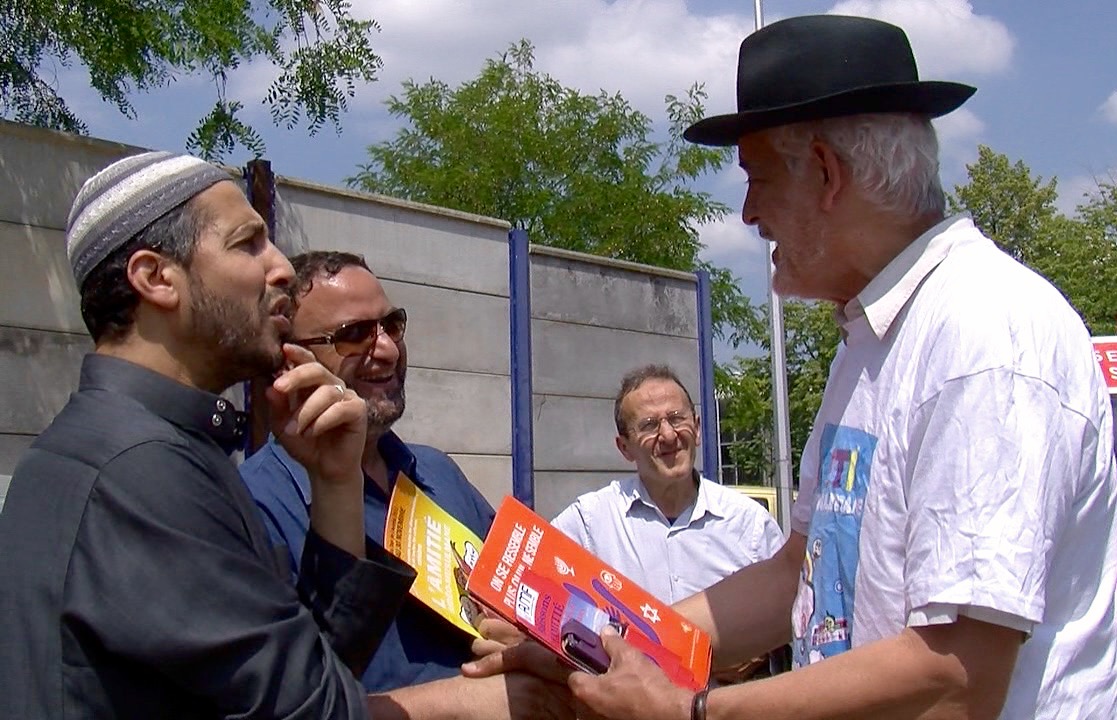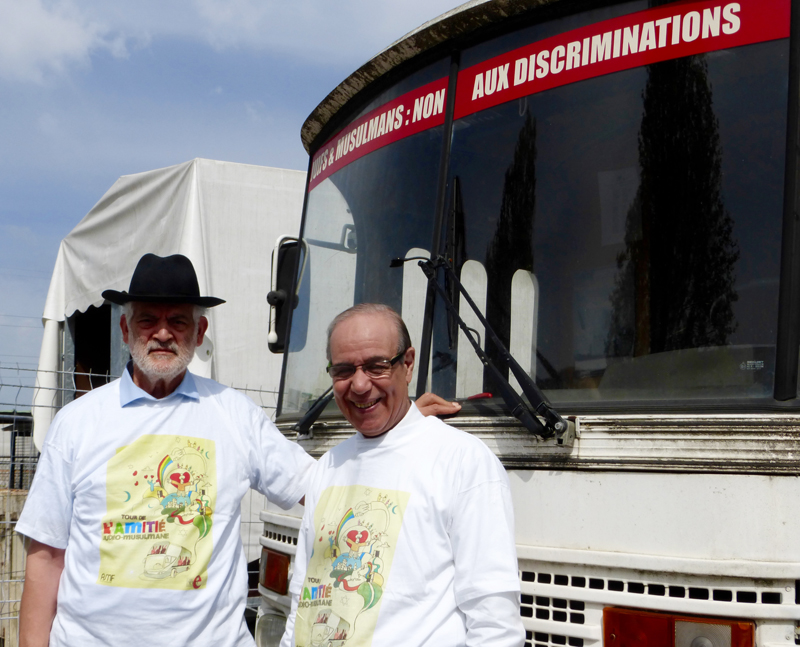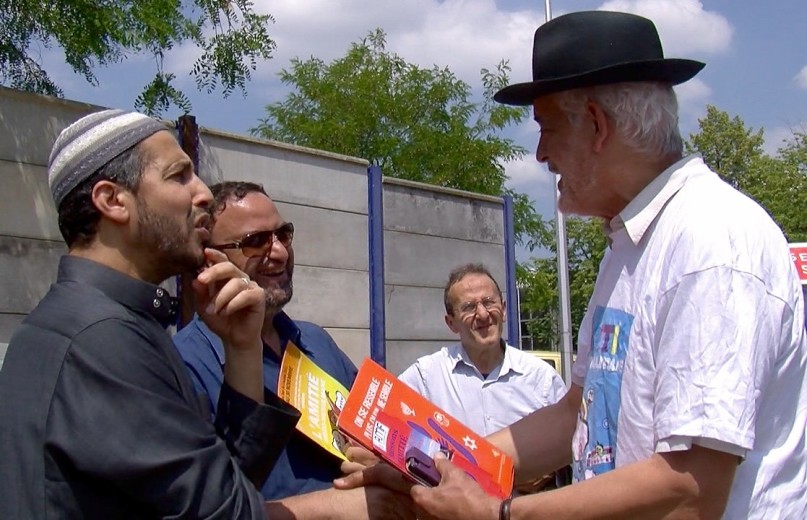
Rabbi Michel Serfaty speaks to Muslim men outside UOIF headquarters. Religion News Service photo by Elizabeth Bryant
LA COURNEUVE, France (RNS) Drivers slow down to stare at the tall figure in a black bowler hat and snow-white beard. “Just the other day, I was called a dirty Jew,” Michel Serfaty is telling a Muslim man. “Now, you’re going to say it isn’t so.”
The man indeed begins to protest — that the remarks are shameful but don’t reflect the sentiments of many Muslims. The two are standing near the glass-fronted headquarters of the Union of Islamic Organizations of France, or UOIF, a popular and conservative association with ties to Egypt’s Muslim Brotherhood. Men are trickling in for prayer on a sunny afternoon.
It’s a strange place to find a rabbi. But Serfaty is not your ordinary rabbi.
For the past decade, Moroccan-born Serfaty has toured France in a beat-up minibus plastered with slogans such as “Solidarity between Jews and Muslims” and “We’re more alike than you think.”
He’s met with Palestinians in Gaza and taken French imams to Auschwitz. But mostly he wades into tough French neighborhoods, striking up conversations with Muslim leaders, students and even drug dealers. Dialogue is what Serfaty’s Jewish-Muslim Friendship Association is all about.
“When we go to some neighborhoods and hear the blackest things about Jews, we’re not there to correct them,” he said. “We’re there to listen and to get people to talk.”
Since the Paris shootings in January — and the gruesome Islamist attack near Lyon on Friday (June 26) — the rabbi’s work has taken a new urgency.
Fears of militant Islam have added new tensions to Jewish and Muslim relations in France, which are already strained by events in the Middle East and anti-Semitism at home. Indeed, the number of anti-Semitic acts recorded by Jewish authorities doubled to more than 850 in 2014, compared with the previous year. Too often, experts say, the authors are young Muslims.
“The state has done nothing for years to improve things,” Serfarty said. “During that time, I’ve gone to all the tinderboxes. I’ve heard the harshest things, but I’ve never had any incident.
“Which means that even with delinquents, there is the possibility of dialogue, of a handshake and a smile.”
The Star of David casts a neon glow on the rabbi as he speaks. Serfaty is seated in his synagogue, in the quiet Paris suburb of Ris-Orangis. A mosque and an evangelical church are just next door — a deliberate feat of urban planning to promote interfaith harmony.
But the soldiers standing watch outside point to another reality. The rabbi has round-the-clock protection since January’s terrorist attacks. In a twist of irony, Amedy Coulibaly, who gunned down four Jews at a kosher supermarket, grew up just a few miles away.

Rabbi Michel Serfaty and Imam Mohammed Azizi stand in front of Serfaty’s bus. Religion News Service photo by Elizabeth Bryant
But there is work to be done on both sides. Serfaty described meeting a group of Hasidic Jews in Paris. “One tells me, ‘Mr. Rabbi, you’re mistaken,’” Serfaty recounted. “‘Isaac and Ishmael (the two sons of Abraham) hated each other. And we Jews and Muslims will hate each other forever.’”
Serfaty works with a small team to shift those hardened views. He wanted to hire an interfaith group, but no Jews applied. So for now, he travels the country with an imam and several young Muslims.
“I’d never met a Jew, so it was a real discovery,” said 24-year-old Mohammed Amine Boudebouz, who joined Serfaty’s staff two years ago. Like the rabbi, Boudebouz’s family comes from Morocco. “My parents are open,” he added. “They grew up with Jews in Morocco, so there’s no problem.”
On a recent morning, Serfaty drives to the UOIF’s headquarters in La Courneuve, a bleak Paris suburb ringed by housing projects. As usual, he arrives unannounced. The organization’s president is away, but accountant Ghazi Wehbi invites him for coffee.
The two exchange pleasantries and pose for photos. Wehbi said Serfaty reminds him of an uncle.
Back outside, Serfaty begins to hand out fliers to the faithful. A few push them away. But soon, he’s struck up a vigorous exchange with 38-year-old Adel Bouafi. A small crowd gathers as the conversation switches from the “dirty Jew” remark to Bouafi’s complaints about Jewish clannishness.
“They call Sarcelles ‘Little Jerusalem’ — that’s shocking in France,” said Bouafi, naming a nearby town. Serfaty laughed. “That’s an old story, dating back 2,000 years,” he replied. “Every town where rabbis gather has been called ‘Little Jerusalem.’”
“We need to act,” Serfaty continued. “We need to break down barriers.” The men gathered around began to nod.
Later, Bouafi described the rabbi as courageous. “It’s a really good initiative to meet young people, to open doors,” he said.
Will it make a difference?
“Everything is possible,” he added.
LM/MG END BRYANT





